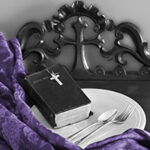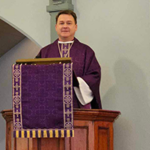This website uses cookies so that we can provide you with the best user experience possible. Cookie information is stored in your browser and performs functions such as recognising you when you return to our website and helping our team to understand which sections of the website you find most interesting and useful.
Discipline:
Body and Soul
Jesus said, “And whenever you fast, do not look somber, like the hypocrites, for they mark their faces to show others that they are fasting. Truly I tell you, they have received their reward.”
— Mt. 6:16 (NRSV)
by Michael Redmond
This year I headed into Lent by getting into a peaceable argument with an old friend — a faithful Episcopalian of Anglo-Catholic persuasion. The argument was about fasting. It’s a subject about which I have considerable ambivalence.
Episcopalians rarely talk about fasting, even though we live in a society obsessed with diet, weight loss, and health. In April, The Wall Street Journal estimated that Americans spent $75 billion on weight loss pharmaceuticals in 2023. Various business sources estimate that the U.S. weight loss “industry,” if we may call it that — all products, services, etc., medical and non-medical — topped $160 billion in 2023. According to the World Bank, that’s approximately the annual Gross Domestic Product of Hungary.
Then I discover my rector had a question for vestry members: “What is your Lenten discipline going to be?” Once again, this Lent, I’m pondering how to respond. My difficulty is not with the idea that I should choose a discipline. Being a disciple means to live under a discipline (a rule, code or method having to do with training or educating, derived from discipulus, the Latin word for pupil). My problem is not with Lent as the time for choosing a particular discipline, because the church has observed Lent as a special season for heightened focus on repentance and spiritual renewal since the fourth century at least. And, fasting has always been a Lenten practice, specifically as preparation for a reverent and heartfelt celebration of Holy Week.
At this point I have to acknowledge that my learned friend, in a spirited defense of fasting, has both scripture and tradition on his side. Fasting is all over scripture. Our prime example is the Lord Jesus, of course, who fasted for 40 days in the desert before he began his public ministry (Luke 4:1−2), echoing the fast of Moses on Mount Sinai (Ex. 34:28). Old Testament examples are too numerous to cite. In Jesus’s day, John the Baptist’s disciples and the Pharisees fasted regularly, and Jesus was challenged to explain why his disciples did not (Mark 2:18−20). In the Book of Acts, we find the early church fasting and praying as they sought guidance from God (Acts 13:2; 14:23).
But did Jesus command his followers to fast? No, it appears that he did not. I’ve heard people interpret Mt. 6:16, as a command to fast, but a close examination of the context does not support that interpretation. “Whenever you fast” (Ὅταν δὲ νηστεύητε) simply recognizes that fasting was a built-in tradition of Jewish religious culture in first century Judea — and we find that Jesus was more concerned that people fast for the right reasons than he was concerned about any rules and regulations of pious practice. Does he command fasting? No. Does he forbid fasting? No.
The concern Jesus expresses is an echo of the prophet Isaiah’s ardent narrative (in full, Is. 6:1−12) of God’s rejection of fasting, but fasting for the wrong reasons:
(The people speak:) “Why do we fast, but you do not see? Why humble ourselves, but you do not notice?” (The Lord answers:) “Look, you serve your own interest on your fast day, and oppress all your workers. Look, you fast only to quarrel and to fight and to strike with a wicked fist. Such fasting as you do today will not make your voice heard on high … Will you call this a fast, a day acceptable to the LORD? Is not this the fast that I choose: to loose the bonds of injustice, to undo the thongs of the yoke, to let the oppressed go free, and to break every yoke? Is it not to share your bread with the hungry, and bring the homeless poor into your house; when you see the naked, to cover them, and not to hide yourself from your own kin?”
Although Jesus did not command fasting, it didn’t take long for the church to do so. Largely inspired by monastic ascetics, elaborate dietary rules governing the entire year became mandatory in both the Eastern and Western churches once Christianity became the official religion. The willful flouting of these stringent regulations was considered to be sinful. Let’s be clear, however: There were always exceptions. Young children, the pregnant, the sick, the aged and infirm, in some cases, those engaged in heavy physical labor. Otherwise, fasting was the rule.
The Protestant Reformers dissented, sometimes fiercely, but it’s a mistake to think of fasting as somehow “a Catholic thing.” Luther, Calvin, Cranmer, and Knox endorsed fasting as a private voluntary practice, and fasted themselves, as did, later on, such mainstream Protestant leaders as John Wesley and Charles Finney. They did not follow the example of Zwingli, who launched the Swiss Reformation with a public display of sausage-eating during Lent.
What troubled the Reformers was fasting’s association with a “works” theology, i.e., we can earn God’s love and our souls’ salvation by doing good works. We find strong language about this in the Church of England’s Thirty-nine Articles of Religion (1571):
XIV. Of Works of Supererogation. Voluntary Works besides, over and above, God’s Commandments, which (Roman Catholics) call Works of Supererogation, cannot be taught without arrogancy and impiety: for by them men do declare, that they not only render unto God as much as they are bound to, but that they do more for his sake, than of bounden duty is required: whereas Christ saith plainly, “When ye have done all that are commanded to you, say, ‘We are unprofitable servants” (Luke 17:10).
“Cranmer knew that Lent was a time that we tend to turn in upon ourselves, to look at our work, our fasting, our effort for God,” writes Zac Hicks on doxologyandtheology.com. “Cranmer believed that a gaze fixed on ourselves actually lacked the power to accomplish the very works it desired. Only a gaze fixed on Christ ─ his merit, his works, his life, his death ─ possessed the power to actually fuel the Lenten fast. The only way we can live for God is for God to ‘give us grace’ to do so.”
“Fasting prepared the mind for prayer, Calvin acknowledged; it enabled Christians to break the tyranny of the flesh and at least temporarily to get the better of their basest desires,” writes Peter Iver Kaufman (Fasting in England in the 1560s: ‘A Thinge of Nought’?). “Fasts also prompted humility, self-deprecation, the sincerest confessions of guilt, and gratitude for God’s grace,” in Calvin’s view.
There are many different ways to fast, and there’s also abstinence. They’re not the same thing. Abstinence is what I mean when I say I’m simply mad for chocolate, so I’m “giving up” chocolate for Lent — my diet otherwise unaffected. We just got through a “Dry January” fad. No consumption of alcohol throughout the month of January — a corrective, one wonders, for over-indulgence during the holidays?
Fasting, however, has to do with what we eat and drink, how much we consume, when we consume it, and how long we practice the discipline. It’s a “total diet” discipline, often including abstinence from meat. We are not meant to starve ourselves when we do a biblical fast, but to resist “the god of the belly” (Phil. 3:19) and other sensual cravings. The discipline of saying “no” to self and enduring some physical discomfort is believed to strengthen our ability to say “no” to sinful desires, also to empower our spiritual vitality. A companion tradition is to give the food one isn’t eating to the poor, or to donate its monetary value to hunger relief.
Those who choose to fast should do so mindfully, i.e., be well informed, start moderately, and consult with clergy and health care providers, as appropriate. A basic tradition is a diet of one full meal a day, supplemented with two light meals (like appetizer portions), with the goal of eating just short of feeling satisfied, in all instances. And plain fare, not rich or luxurious fare.
My fast-defending friend raises an interesting point, that we tend to over-spiritualize our religious practice, neglecting the body as an essential constituent of the human nature that was divinized in Christ.
The body, too, partakes in our sanctification by the indwelling of the Holy Spirit. This is the very body we speak of when the Creed proclaims one of the most mysterious of Christian doctrines, the resurrection of the body. “Do you not know that your body is a temple of the Holy Spirit within you, which you have from God, and that you are not your own? For you were bought with a price; therefore, glorify God in your body,” St. Paul teaches (1 Cor. 6:19−20).
How do we do that? We so often think of the body as either irrelevant to our spiritual growth or as an obstacle to it. For health or esthetics, we are willing to whip the body into shape by diet, jogging, body-building, gymnasiums, athletics, etc., with no thought given to what the body means in our spiritual life. One question I’m pondering this Lent: How can I glorify God with my body? A few answers: Sing those hymns, bow and kneel, make the sign of the cross — and now, maybe, fast?
Whether we choose to fast or not, let’s keep a holy Lent in the spirit of these words by the Rt. Rev. Steven Charleston, retired bishop of the Episcopal Diocese of Alaska:
“If you want to stay in shape, you need to exercise. That is as true for the spirit as the body. Here are a few spiritual exercises to use: Bend to help someone else up. Stretch to give generously. Run away from temptation. Climb to a higher level of learning. Jump on the chance to be loving. Lift up your heart. Hang on to your values. Push back against injustice. Those are some of the ones I remember from childhood. They stayed with me because they each speak so simply to a part of what it means to live an active spiritual life. You may be able to think of more. They are part of what it means to walk with God.”

A versatile editor and writer with an extensive background in daily journalism, Michael Redmond, is a regular contributor to the Delaware Communion and a member of the diocesan communications team. mr@michaelredmond.net






